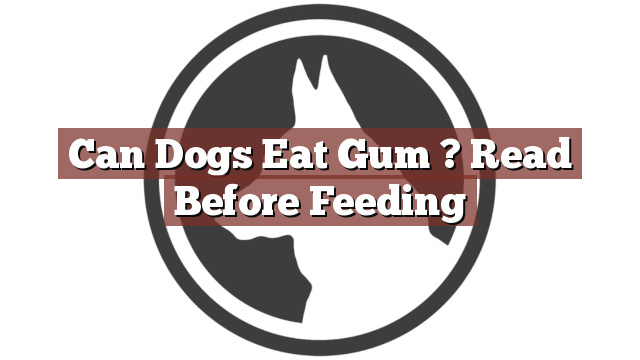Understanding Your Dog’s Dietary Needs
As responsible pet owners, it is crucial to understand the dietary needs of our furry friends. Dogs require a well-balanced diet that consists mainly of high-quality dog food. While it may be tempting to share our food with them, it is essential to be cautious about what we offer them. Certain human foods can be harmful or even toxic to dogs, and gum is one such item that deserves our attention.
Can Dogs Eat Gum? Read Before Feeding
Can dogs eat gum? The short answer is no. Gum contains a sweetener called xylitol, which can be extremely dangerous for dogs. Xylitol is a sugar alcohol that is commonly used as a sugar substitute in many sugar-free products, including gum. While it is safe for humans, even in large quantities, it can be highly toxic to dogs.
When a dog ingests gum containing xylitol, it can cause a rapid release of insulin in their body, leading to a dangerous drop in blood sugar levels. This condition, known as hypoglycemia, can result in symptoms such as vomiting, loss of coordination, seizures, and even liver failure. Therefore, it is crucial to keep gum and any other xylitol-containing products well out of reach of our furry friends.
Pros and Cons of Feeding Gum to Dogs
There are no advantages to feeding gum to dogs. The potential risks far outweigh any perceived benefits. While chewing gum may provide some mental stimulation for dogs, it is not necessary for their overall well-being. There are plenty of safe and enjoyable chew toys available that can provide the same level of entertainment without posing any health risks.
On the other hand, the cons of allowing dogs to chew gum are significant. Apart from the risk of xylitol poisoning, gum can also pose a choking hazard for dogs, especially if they swallow it whole or get it stuck in their throat. Additionally, the artificial sweeteners and other additives present in gum can upset a dog’s digestive system, causing diarrhea, bloating, or other gastrointestinal issues.
Conclusion: Weighing the Risks and Benefits
In conclusion, it is crucial to remember that dogs should not be fed gum under any circumstances. The presence of xylitol in gum can lead to severe health complications and even be life-threatening for our beloved pets. As responsible pet owners, we must educate ourselves about the potential dangers of certain human foods and ensure that our dogs receive a safe and balanced diet that meets their specific nutritional needs. If you suspect that your dog has ingested gum or any other product containing xylitol, it is essential to seek immediate veterinary care to prevent any further complications.
Thank you for taking the time to read through our exploration of [page_title]. As every dog lover knows, our furry friends have unique dietary needs and responses, often varying from one canine to another. This is why it's paramount to approach any changes in their diet with caution and knowledge.
Before introducing any new treats or making alterations to your dog's diet based on our insights, it's crucial to consult with a veterinarian about [page_title]. Their expertise ensures that the choices you make are well-suited to your particular pet's health and well-being.
Even seemingly harmless foods can sometimes lead to allergic reactions or digestive issues, which is why monitoring your dog after introducing any new food item is essential.
The content provided here on [page_title] is crafted with care, thorough research, and a genuine love for dogs. Nevertheless, it serves as a general guideline and should not be considered a substitute for professional veterinary advice.
Always prioritize the expert insights of your veterinarian, and remember that the health and happiness of your furry companion come first.
May your journey with your pet continue to be filled with joy, love, and safe culinary adventures. Happy reading, and even happier snacking for your canine friend!

